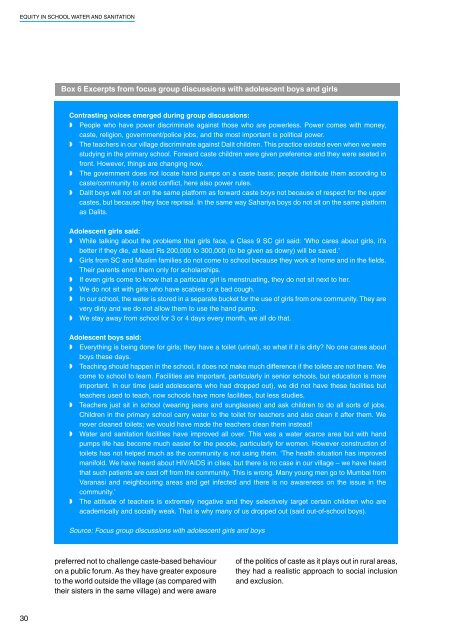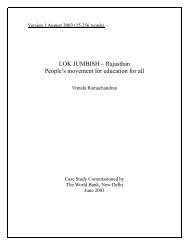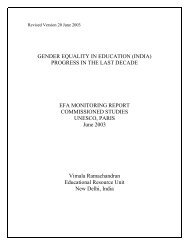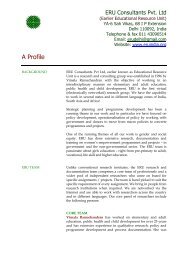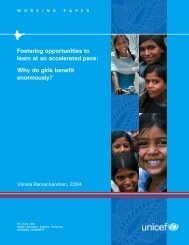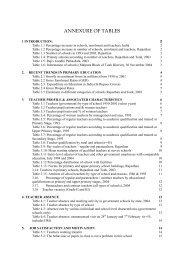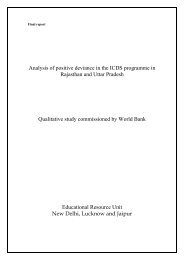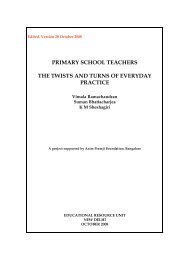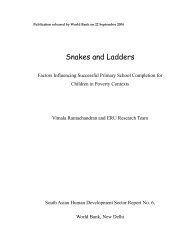EQUITY IN SCHOOL WATER AND SANITATIONBox 6 Excerpts from focus group discussions with adolescent boys <strong>and</strong> girlsContrast<strong>in</strong>g voices emerged dur<strong>in</strong>g group discussions: People who have power discrim<strong>in</strong>ate aga<strong>in</strong>st those who are powerless. Power comes with money,caste, religion, government/police jobs, <strong>and</strong> the most important is political power. The teachers <strong>in</strong> our village discrim<strong>in</strong>ate aga<strong>in</strong>st Dalit children. This practice existed even when we werestudy<strong>in</strong>g <strong>in</strong> the primary school. Forward caste children were given preference <strong>and</strong> they were seated <strong>in</strong>front. However, th<strong>in</strong>gs are chang<strong>in</strong>g now. The government does not locate h<strong>and</strong> pumps on a caste basis; people distribute them accord<strong>in</strong>g tocaste/community to avoid conflict, here also power rules. Dalit boys will not sit on the same platform as forward caste boys not because of respect for the uppercastes, but because they face reprisal. In the same way Sahariya boys do not sit on the same platformas Dalits.Adolescent girls said: While talk<strong>in</strong>g about the problems that girls face, a Class 9 SC girl said: ‘Who cares about girls, it’sbetter if they die, at least Rs 200,000 to 300,000 (to be given as dowry) will be saved.’ Girls from SC <strong>and</strong> Muslim families do not come to school because they work at home <strong>and</strong> <strong>in</strong> the fields.Their parents enrol them only for scholarships. If even girls come to know that a particular girl is menstruat<strong>in</strong>g, they do not sit next to her. We do not sit with girls who have scabies or a bad cough. In our school, the water is stored <strong>in</strong> a separate bucket for the use of girls from one community. They arevery dirty <strong>and</strong> we do not allow them to use the h<strong>and</strong> pump. We stay away from school for 3 or 4 days every month, we all do that.Adolescent boys said: Everyth<strong>in</strong>g is be<strong>in</strong>g done for girls; they have a toilet (ur<strong>in</strong>al), so what if it is dirty? No one cares aboutboys these days. Teach<strong>in</strong>g should happen <strong>in</strong> the school, it does not make much difference if the toilets are not there. Wecome to school to learn. Facilities are important, particularly <strong>in</strong> senior schools, but education is moreimportant. In our time (said adolescents who had dropped out), we did not have these facilities butteachers used to teach, now schools have more facilities, but less studies. Teachers just sit <strong>in</strong> school (wear<strong>in</strong>g jeans <strong>and</strong> sunglasses) <strong>and</strong> ask children to do all sorts of jobs.Children <strong>in</strong> the primary school carry water to the toilet for teachers <strong>and</strong> also clean it after them. Wenever cleaned toilets; we would have made the teachers clean them <strong>in</strong>stead! <strong>Water</strong> <strong>and</strong> sanitation facilities have improved all over. This was a water scarce area but with h<strong>and</strong>pumps life has become much easier for the people, particularly for women. However construction oftoilets has not helped much as the community is not us<strong>in</strong>g them. ‘The health situation has improvedmanifold. We have heard about HIV/AIDS <strong>in</strong> cities, but there is no case <strong>in</strong> our village – we have heardthat such patients are cast off from the community. This is wrong. Many young men go to Mumbai fromVaranasi <strong>and</strong> neighbour<strong>in</strong>g areas <strong>and</strong> get <strong>in</strong>fected <strong>and</strong> there is no awareness on the issue <strong>in</strong> thecommunity.’ The attitude of teachers is extremely negative <strong>and</strong> they selectively target certa<strong>in</strong> children who areacademically <strong>and</strong> socially weak. That is why many of us dropped out (said out-of-school boys).Source: Focus group discussions with adolescent girls <strong>and</strong> boyspreferred not to challenge caste-based behaviouron a public forum. As they have greater exposureto the world outside the village (as compared withtheir sisters <strong>in</strong> the same village) <strong>and</strong> were awareof the politics of caste as it plays out <strong>in</strong> rural areas,they had a realistic approach to social <strong>in</strong>clusion<strong>and</strong> exclusion.30
Overcom<strong>in</strong>g Exclusion <strong>and</strong> Discrim<strong>in</strong>ation <strong>in</strong> South AsiaIndia Country Report4.9 The Dynamics of Inclusion<strong>and</strong> ExclusionThe dynamics of <strong>in</strong>clusion <strong>and</strong> exclusion manifest<strong>in</strong> many ways <strong>and</strong> often it is not talked about <strong>in</strong> theopen; forward caste teachers are vocal <strong>and</strong> voicetheir prejudices <strong>in</strong> private or <strong>in</strong> one-to-oneconversations but do not speak about it <strong>in</strong> public.The situation on the ground <strong>in</strong> UP has changed alot <strong>in</strong> the last ten years <strong>and</strong> the ascendance of aDalit political party to power has had a positiveimpact. But prejudice <strong>and</strong> exclusion cont<strong>in</strong>ues <strong>in</strong>subtle <strong>and</strong> not-so-subtle ways. Teachers, especially<strong>in</strong> Lalitpur, were dismissive of the academic potentialof children from extremely poor communities <strong>and</strong>from specific social groups like Sahariya. Almost allthe teachers differentiated between the relativelybetter-off (<strong>in</strong>clud<strong>in</strong>g Dalits <strong>and</strong> other sociallydeprived groups) <strong>and</strong> those who are very poor. Theypo<strong>in</strong>ted to poverty <strong>and</strong> lack of parental educationas one of the reasons for poor performance <strong>and</strong>exclusion of some children from school.In Mirzapur, most of the children study<strong>in</strong>g <strong>in</strong>government primary schools are from poor families.However, the profile of students changes <strong>in</strong> the highschool. Almost one-fourth of the children who enrol<strong>in</strong> primary schools drop out after Class 5. A numberof studies done over the last ten years show that anoverwhelm<strong>in</strong>g proportion of the very poor drop outbefore they reach Class 6 <strong>and</strong> among them theproportion of Muslim, SC <strong>and</strong> ST children is farhigher than it is <strong>in</strong> the other social groups (Jha <strong>and</strong>Jh<strong>in</strong>gran, 2005; Ramach<strong>and</strong>ran, 2004).The area where <strong>in</strong>clusion <strong>and</strong> exclusion plays outis <strong>in</strong> the nature of duties assigned to children. Whilethere are significant differences between the twodistricts, it is fairly clear that children fromeconomically better-off families are exempt fromclean<strong>in</strong>g toilets with a broom <strong>and</strong> brush. All childrenmay participate <strong>in</strong> pour<strong>in</strong>g (actually throw<strong>in</strong>g) waterfrom a distance, sweep<strong>in</strong>g <strong>and</strong> dust<strong>in</strong>g theclassrooms, pick<strong>in</strong>g up litter (like paper <strong>and</strong> otherarticles on the ground) <strong>and</strong> fetch<strong>in</strong>g water. Parentsdo not like their children to clean the premises <strong>and</strong>toilets <strong>and</strong> they depend on the village sweeper 27paid for by the pradhan for such services. So if thepradhan is proactive <strong>and</strong> concerned about theschool, a sweeper becomes available, otherwiseclean<strong>in</strong>g the school campus <strong>and</strong> toilets rema<strong>in</strong>s aproblem. Government primary <strong>and</strong> upper primaryschools do not have any funds to hire a person toclean the premises <strong>and</strong> they depend on the villagePanchayat <strong>and</strong> the pradhan to arrange paymentsfor this.4.10 Learn<strong>in</strong>g from the StudyThe learn<strong>in</strong>g from this study is quite unambiguous:construction of toilets or the <strong>in</strong>stallation of h<strong>and</strong>pumps <strong>and</strong> water tanks is not enough. The contrastbetween Mirzapur <strong>and</strong> Lalitpur also teaches us oneimportant lesson. The government <strong>and</strong> civil societyorganizations need to first focus on build<strong>in</strong>g anenvironment where cleanl<strong>in</strong>ess is appreciated as apositive value. The total sanitation movement <strong>in</strong>Mirzapur has certa<strong>in</strong>ly contributed towards chang<strong>in</strong>gsocial attitudes <strong>and</strong> practices. Children who usetoilets properly <strong>in</strong> school promote toilet clean<strong>in</strong>g <strong>in</strong>their homes <strong>and</strong> make sure that all family membersuse the toilet properly; they are also more likely tospread the same practices <strong>in</strong> the village. Yes, goodpractices learnt <strong>in</strong> school are also transferred to theirhomes, but for this to happen the overallenvironment needs to be positive. Where thegeneral hygiene levels are poor, where the socialfabric is fractured by social conflicts <strong>and</strong> communityidentities, the school cannot hope to br<strong>in</strong>g aboutlast<strong>in</strong>g change. The school <strong>and</strong> the community arel<strong>in</strong>ked – one re<strong>in</strong>forces <strong>and</strong> strengthens the goodpractices of the other. Equally, the reverse is alsotrue – a school could emerge as an isl<strong>and</strong> of sorts,but for the good practice to susta<strong>in</strong> over a long period<strong>and</strong> across different school heads, the communityhas to be appreciative of the good practice.Facilities, their safety, <strong>in</strong>clusiveness, use <strong>and</strong>ma<strong>in</strong>tenance: Design, ma<strong>in</strong>tenance <strong>and</strong> recurr<strong>in</strong>gfunds are important. One of the important lessonsof this study is that <strong>in</strong>frastructure provision needsto be backed up with funds for ma<strong>in</strong>tenance <strong>and</strong>repair, for runn<strong>in</strong>g costs, <strong>and</strong> most importantly,systematic education of the users on how to use<strong>and</strong> how to ma<strong>in</strong>ta<strong>in</strong> the <strong>in</strong>frastructure. Equallysignificant is that the toilets <strong>and</strong> water sources aredesigned with care. Local people, teachers <strong>and</strong>technicians need to work together to build facilitiesthat are safe to use, <strong>and</strong> are accessible to all,especially children with special needs, <strong>and</strong> havesufficient light <strong>and</strong> ventilation.27The UP government has recently recruited sweepers for villages by pass<strong>in</strong>g a Government Order for the Panchayats.31


